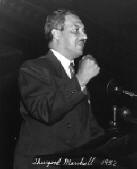
|
Brown vs. Topeka
Board of Education |
|||||||||||||||||||||||||||||||||||||||||||||||||||||
|
|
|||||||||||||||||||||||||||||||||||||||||||||||||||||
|
Plessy vs. Ferguson
On June 7th, 1892 Homer Plessy, a man of seven-eighth Caucasian and one-eighth African blood, paid and engaged for a first class passage on East Louisiana Railway from the New Orleans to Covington. Under the penalty of ejection from the train he was told to move to a vacant seat. He refused to do so and with aid of an officer was forcibly removed from the coach and taken to the Parish Jail of New Orleans, Louisiana where he was found guilty of criminally violating an act of the general assembly of the state. He was brought before the recorder of the city for preliminary examination and committed for trial to the criminal district court for the Parish of Orleans where information was filed against him. The petitioner interposed a plea on information based on unconstitutionality of the act of general assembly. His plea was overruled. The court did proceed to fine and sentence the petitioner to imprisonment. Not withstanding, the unconstitutionality of the act he was being persecuted under. The filing of the petition made an order which was issued upon the respondent. Plessy declined and refused to admit that he was an any proportion a colored man. The Supreme Court denied the relief prayed for by Plessy that a writ of error comes from the court allowed by the chief justice of the supreme court. Men of the Court: Mr. Justice Harlan dissenting A.W. Tourgee and S.F. Phillips, for plaintiff error Alex Porter Morse, for the defendant in error Mr. Justice Brown, after stating the facts in the foregoing language, delivered the opinion of the court It was mentioned that no person or persons shall be permitted to occupy seats in their coach, other than the ones assigned to them, on account of the race they belong to. Officers aboard such passenger trains are required to make sure each person or persons are seated in the correct section. If passenger insisted and stayed they may be fined twenty-five dollars, or in lieu thereof to imprisonment for a period of no more than twenty days in the parish prison. Plessy being a passenger between two stations within the state of Louisiana, was assigned by officers of the company to the coach used for the race which he belonged, but he insisted on going into by the race he belonged to. Neither in the information nor the plea was his particular race or color mentioned. He was entitled to every right and privilege secured to the United States of the white race and took possession of a vacant seat where passenger of the white race were supposed to be seated. " It would be running the slavery question into the ground,' said Mr. Justice Bradley,' to make it apply to every act of discrimination which a person may see fit to make as to the guests he will entertain, or as to the people he will take into his coach or cab or car, or admit to his concert or theater, or deal with in other matters of intercourse or business.' The fourteenth amendment states:
Jen Shaver Kylee Templer
|
|
|
|||||||||||||||||||||||||||||||||||||||||||||||||||


